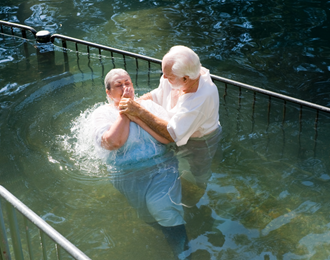Water baptism is Israelite heritage
08-08-2025 - Posted by Geert-JanOriginally posted on August 7, 2025 – by Andre Piet
In Hebrews 6:1–2, several fundamental doctrines are listed that belong to “the beginning of the word of Christ,” addressed to the people of Israel. One of them is: “a teaching of baptizings” — plural. The Hebrews were traditionally familiar with all kinds of ritual washings in which one cleansed oneself according to the law. What was special about John’s baptism was that someone else baptized them. But this baptism too was explicitly intended for Israel. John himself says:
“And I was not aware of Him, but that He may be manifested to Israel, therefore I came baptizing in water.”
– John 1:31
Water baptism is a typically Israelite phenomenon. To the people of Israel were entrusted the covenants, the legislation, the service of worship including the rituals:
“Whose is the sonship and the glory and the covenants and the legislation and the divine service…”
– Romans 9:4
The purpose of John’s baptism was to prepare the people of Israel for the coming of the Messiah and His kingdom. Repentance and water cleansing were the visible signs of that.
What then about the nations?
Against the observation that water baptism is an Israelite phenomenon, it is often objected that Gentiles were also baptized in the book of Acts. Examples cited are Cornelius (Acts 10), Lydia (Acts 16), and the jailer in Philippi (Acts 16). According to some, this would contradict the idea that water baptism belongs exclusively to Israel.
But what is overlooked is that all these Gentiles, without exception, were baptized by Israelites. Peter was an apostle of the circumcision, Paul a Hebrew of Hebrews. None of these baptisms took place apart from Israel — they were always administered through Jewish hands. Water baptism, even in these cases, did not come to the nations as an independent ritual, but had everything to do with Israel and her recognition of God’s work among the nations. It remains a ritual administered via Israel.
Moreover: it was not the Gentiles who needed this ritual, but Israel had to know that salvation had also come to the nations. When the holy Spirit fell on the house of Cornelius, Peter said:
“Can anyone forbid the water, that these may not be baptized, who obtained the holy spirit even as we as well? And he commands them to be baptized in the name of Jesus Christ.”
– Acts 10:47,48
Take note: it is not Cornelius and his people who receive the instruction to be baptized, but Peter’s Jewish companions receive the instruction to baptize them. The baptism followed as a sign for the Jewish people. It was a testimony of recognition that they too belonged. It is precisely in this line that Paul says at the close of Acts:
“Let it then be known to you that to the nations was dispatched this salvation of God, and they will hear.”
– Acts 28:28
Throughout the book of Acts, the message was addressed to Israel, and was underscored with visible signs, such as miracles, speaking in foreign tongues, but also water baptism. But with Acts 28, the curtain falls for Israel. The Evangel continues — but without Israel, and without visible signs.
The one baptism
In Paul’s letters to the ecclesia from among the nations, we also find no call to water baptism. Not even during his Acts ministry. He writes:
“For Christ does not commission me to be baptizing, but to be bringing the evangel.”
– 1 Corinthians 1:17
That does not mean there is no baptism — on the contrary! There is today one baptism that truly matters (Eph. 4:5):
“For in one spirit also we all are baptized into one body.”
– 1 Corinthians 12:13
This baptism in Christ is a spiritual reality. No ceremony, no water, no human hand. Water baptism belongs to the visible service of worship given to Israel. It was given as a sign and preparation within an earthly people with an earthly destiny. But whoever today has a part in the body of Christ, is baptized in one spirit, into one body. Not a ritual, but a living reality. That is enough. More than enough.

 English Blog
English Blog